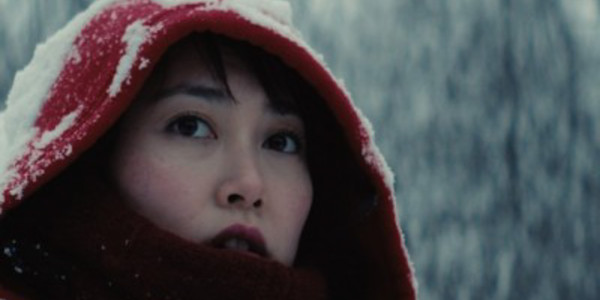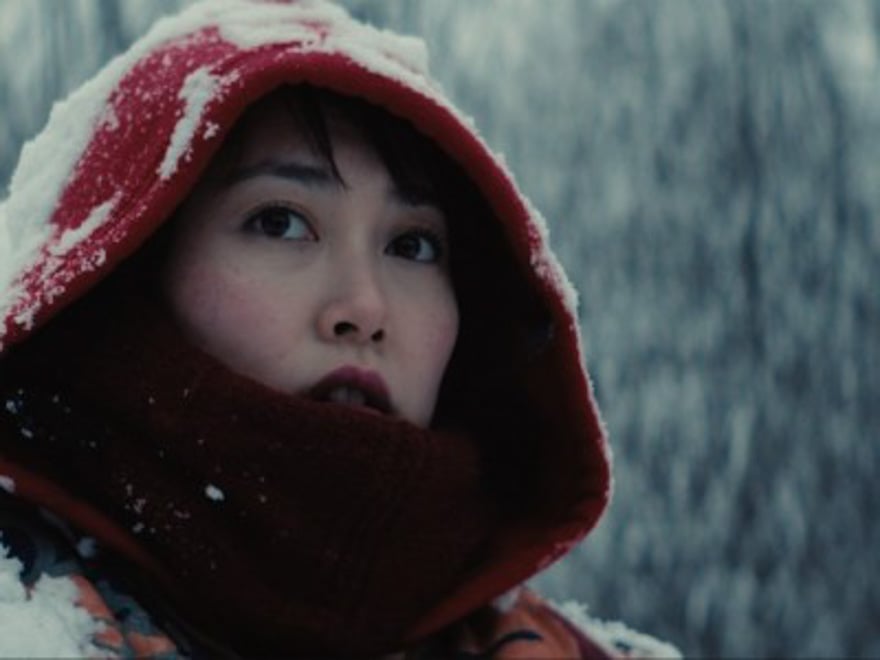
An enigmatic woman in red trudges through the greenery of a vibrant forest in the opening moments of writer-director David Zellner’s “Kumiko, the Treasure Hunter.” She walks with her back to the camera, both her identity and her purpose shrouded in mystery. Though this spot of red eventually reveals herself to be our protagonist — the titular Kumiko (Rinko Kikuchi) — Zellner never lets us see beyond her scarlet hood. Relying far too heavily upon the film’s apparent situational intrigue, Zellner allows Kumiko, and the film itself, to become coldy impenetrable: bland, superficial and most certainly dull.
After Kumiko finishes her brief foray into the uncharted wilderness, she promptly returns to Tokyo, Japan, both her place of residence and her place of work. There, Kumiko resumes the listless march through the mundanity of her existence: Her mother is overbearing, her friends are repulsively happy and her boss is a misogynistic pig. Yet Kumiko trudges onward, at night seeking refuge in a worn VHS tape of Joel and Ethan Coen’s “Fargo.” You see, Kumiko, a bit of a romantic at heart, naively believes that the scratchy old videotape will lead her to a briefcase of money abandoned amidst the frozen tundra of North Dakota during the film’s climax. Thus, Kumiko operates under the assumption that, if she can make her way to America, she can claim the treasure for herself and remedy the tedium of her humdrum life. So when she attains “Fargo” on DVD, Kumiko bids adieu to her rabbit and catches a flight to Minneapolis, Minnesota to pursue her destiny abroad.

In its premise and plot structure, “Kumiko” seems to boast both a certain playfulness and a screwball sensibility. Yet in its execution, “Kumiko” is surprisingly uninspired. Zellner clearly has a taste for the static long shot, but the film’s content is hardly engaging enough to justify such a trying stylistic flourish: The film’s narrative banality constantly taxes the attention span, leaving very little to truly ignite the imagination. In one scene, in which Kumiko sits conversing with a police officer, Zellner elects to neither cut nor provide any significant information. Instead, he lets his characters flounder in hopes that the clear juxtaposition between their identities — he’s an affable Midwesterner, she’s a quiet and skeptical foreigner — will somehow entertain. In many ways, this is the center of the film’s difficulties: Zellner consistently employs the goofy irregularity of this tidy little tale as a steady crutch.
Yet, nothing really happens in “Kumiko, the Treasure Hunter.” In reality, the plot is about as thin as a sheet of paper: A woman dedicates her life to finding a treasure that doesn’t exist, and when the illusion is revealed, the curtain pulled back, she refuses to believe the deception. Sure, there have been films founded upon less (“127 Hours,” “Wild”) but those films, at least, had one thing which “Kumiko” oh-so-obviously lacks: engaging characters.
Besides Kumiko, there are six other named characters in this nearly two-hour film, and all appear onscreen for what is probably a combined total of less than 20 minutes — which leaves Kumiko to carry the vast majority of the narrative weight.

And don’t get me wrong, if you’re going to choose one actress to single-handedly carry your film, the always entrancing Rinko Kikuchi is not your worst option. Here, however, Kikuchi demonstrates none of her characteristic charm. Sure, much of this can be attributed to the film’s script — which, upon Kumiko’s arrival in the US, leaves Kikiuchi with little to do but appear damaged and determined — but, at the same time, Kikuchi doesn’t exactly do much to bridge the gap between audience and screen. Save for a few emotional breakdowns, there is no seeing inside Kikuchi’s head. She has no evident ticks — just a steady gait and unflinchingly blank expression — and she gives off no real external clues as to her internal state. Thus, as Zellner pushes us to accept a series of increasingly outlandish decisions, it’s hard to really care about what happens to Kumiko, despite how eccentric and endearing she may appear in theory.
In recent years, there has been a near constant emergence of art inspired by the now classic “Fargo” — including an exceptional television series — and “Kumiko, the Treasure Hunter” easily slips into this developing category. Unlike its contemporary counterparts, however, “Kumiko” fails to understand what made “Fargo” so successful in the first place: “Fargo” does not derive its cult status from its outwardly quirky conceit. Instead, the Coen Brothers’ film owes its widespread acclaim to an energetic predilection for the absurd and an acute focus on impassioned character development — attributes which are so evidently absent from Zellner’s “Kumiko.”
Contact Will Ferrer at wferrer ‘at’ stanford.edu.
